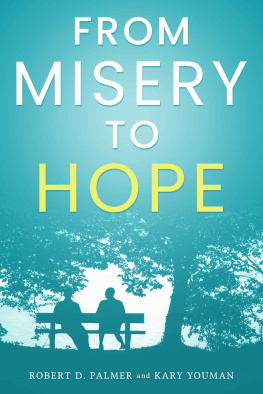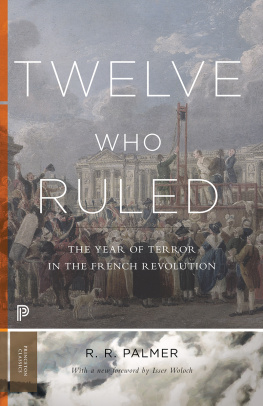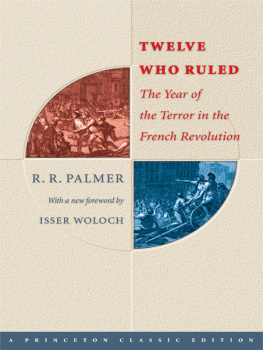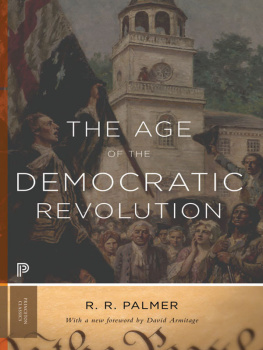ROUTLEDGE LIBRARY EDITIONS: THE FRENCH REVOLUTION
Volume 6
THE WORLD OF THE FRENCH REVOLUTION
THE WORLD OF THE FRENCH REVOLUTION
R. R. PALMER
First published in 1971 by George Allen & Unwin Ltd
This edition first published in 2016
by Routledge
2 Park Square, Milton Park, Abingdon, Oxon OX14 4RN
and by Routledge
711 Third Avenue, New York, NY 10017
Routledge is an imprint of the Taylor & Francis Group, an informa business
1971 Robert R. Palmer
All rights reserved. No part of this book may be reprinted or reproduced or utilised in any form or by any electronic, mechanical, or other means, now known or hereafter invented, including photocopying and recording, or in any information storage or retrieval system, without permission in writing from the publishers.
Trademark notice: Product or corporate names may be trademarks or registered trademarks, and are used only for identification and explanation without intent to infringe.
British Library Cataloguing in Publication Data
A catalogue record for this book is available from the British Library
ISBN: 978-1-138-66567-5 (Set)
ISBN: 978-1-315-54584-4 (Set) (ebk)
ISBN: 978-1-138-68108-8 (Volume 6) (hbk)
ISBN: 978-1-315-56426-5 (Volume 6) (ebk)
Publishers Note
The publisher has gone to great lengths to ensure the quality of this reprint but points out that some imperfections in the original copies may be apparent.
Disclaimer
The publisher has made every effort to trace copyright holders and would welcome correspondence from those they have been unable to trace.
The World of the French Revolution
R. R. PALMER
To my wife
First published in Great Britain in 1971
This book is copyright under the Berne Convention. All rights are reserved. Apart from any fair dealing for the purpose of private study, research, criticism or review, as permitted under the Copyright Act, 1956, no part of this publication may be reproduced, stored in a retrieval system, or transmitted, in any form or by any means, electronic, electrical, chemical, mechanical, optical, photocopying, recording or otherwise, without the prior permission of the copyright owner. Enquiries should be addressed to the publishers.
Robert R. Palmer 1971
ISBN 0 04 944009 8 Cased
0 04 944010 1 Paper
This work was first published in French under the title
1789: Les Rvolutions de la libert et de lgalit
Calmann-Lvy, 1967
Printed in Great Britain
by Compton Printing Ltd
London and Aylesbury
Contents
THE PRESENT BOOK, though wholly new, is also largely an abridgment of the second volume of my Age of the Democratic Revolution, published in 1964 by Princeton University Press. Hence there are occasional similarities of language which a careful reader might discover. Some parts, especially the first and last chapters, have no equivalent in the earlier work.
The book was first written at the request of the French publisher, Mr. Robert Calmann-Lvy, for translation into French and inclusion in his series Great Waves of Revolution. It appeared in Paris in 1968 under the title 1789: Les Rvolutions de la libert et de lgalit. Though now published later than the French version, the present book is in fact the original. It is adapted to the purpose of the French series, in which each volume was to stress not only its own revolution but the wave of international repercussions which accompanied it or into which it merged.
I should like to express my thanks to the Centre International Universitaire in Paris, which provided me with the pleasant accommodations in which the book was written. Most of all I am indebted to my wife, who bore with the writing of this book at a time when we might have enjoyed, and perhaps even needed, a more carefree leave of absence.
New Haven, Conn. | R. R. P. |
June, 1970 |
THE WORLD OF THE FRENCH REVOLUTION
THERE ARE DATES ON WHICH HISTORY seems to turn, and which become symbols loaded with meaning. Such for the English is 1066, the year of the Norman Conquest. The Americans have such a magic number in 1492, marking the discovery of Americathat is, the beginning of its Europeanization. The date 1789 provides as great a symbol for the French, and indeed the world. It is the dawn of Liberty and Equality, or more prosaically the point of transition between the Old Order and modern society. One of the purposes of this book will be to explain why this transition took the form of revolution. Revolutionary it was, however, and in fact one of the most portentous consequences of the upheaval was the invention of revolution itself, the launching of the beliefor, as some would say, myththat human problems will be solved by a vast phenomenon in world history known as the revolution. No one had made any such supposition before 1789, not even those Frenchmen who, in the course of events, became revolutionaries.
The shock of 1789 produced waves that spread in all directionsthrough society, through space, and through time. Socially, while the movement of 1789 was initiated by the upper and educated classes, it soon imparted itself to the whole population of France. It aroused to political action, and to political purpose and consciousness, deeper levels of society, on the farms and in the workshops, in a way never seen before on so large a scale. By 1792, for the first time in an advanced country of 25 million people, the world saw a republic that its leaders called democratic.
In space, the explosion of 1789 sent immediate tremors through Europe and those parts of the world with which Europe then had close connections. The violence in France merged with lesser eruptions, or more local revolutionary developments, which had already begun independently of French influence in Holland and Belgium, at Geneva in Switzerland, in Ireland, and in Poland. The French Revolution of 1789 absorbed and soon surpassed the influence of the American Revolution of some fifteen years before. After the great war came in 1792 between revolutionary France and the European powers, and after the French Republic began to win victories, new revolutionary states were set up: the Batavian Republic of 1795 in the Netherlands; the Cisalpine, Ligurian, Roman, and Neapolitan Republics in Italy from 1796 to 1799; the Helvetic Republic in Switzerland in 1798. During the same war the reform movement in Poland turned into the unsuccessful revolution led by Kosciuszko. The United Irish rose in a vain attempt to create an independent republic in Ireland. England and Scotland were full of active sympathizers with the French Revolution, who demanded far-reaching changes in the institutions of Great Britain. In the United States, where the new federal constitution was just going into operation, the political character of the new country was profoundly shaped by conflicting attitudes toward the French Revolution. In the West Indies, in the French sugar colony of Saint-Domingue, events led to the proclamation of the independent republic of Haiti; it was the first example in which a black population overthrew and expelled its white masters. Lesser agitations in Spanish and Portuguese America anticipated the independence that came a generation later. After 1800, with the continuing victories of the French under Napoleon, reforming administrators in Germany, Italy, the Netherlands, Switzerland, Poland, and to some degree even in Spain, welcomed the opportunity to cooperate with the French in the modernizing of their own countries, along lines laid down by the French Revolution of 1789.











